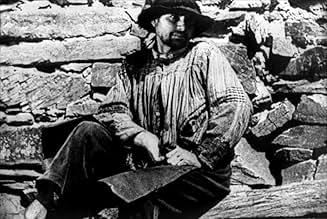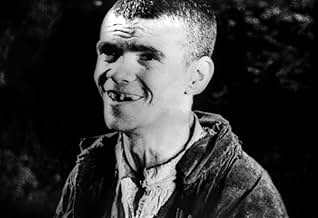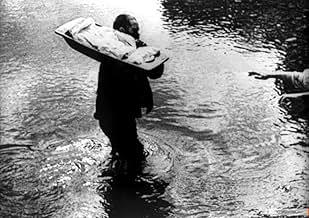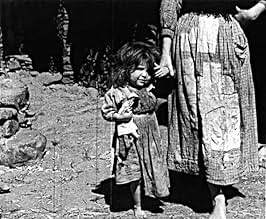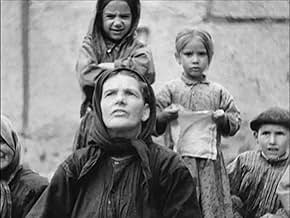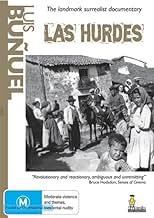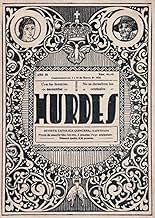IMDb RATING
7.3/10
6.6K
YOUR RATING
A surrealist film, a pseudo-documentary portrait of Las Hurdes, a remote region of Spain where civilisation has barely developed, showing how the local peasants try to survive without even t... Read allA surrealist film, a pseudo-documentary portrait of Las Hurdes, a remote region of Spain where civilisation has barely developed, showing how the local peasants try to survive without even the most basic utilities and skills.A surrealist film, a pseudo-documentary portrait of Las Hurdes, a remote region of Spain where civilisation has barely developed, showing how the local peasants try to survive without even the most basic utilities and skills.
- Director
- Writers
- Stars
Abel Jacquin
- Self
- (voice)
Alexandre O'Neill
- Self
- (voice)
- Director
- Writers
- All cast & crew
- Production, box office & more at IMDbPro
7.36.6K
1
2
3
4
5
6
7
8
9
10
Featured reviews
10groveman
Absolutely great film and definitive example of surrealism
I found it very interesting reading the reactions of others here, from interpreting this as everything from a pure comedy to a pure documentary. The truth is that it denies classification, and for many that just simply does not compute. Therefore, it has obviously done exactly what Bunuel wanted.
The aim of surrealism is to lure you in with the trap of a conventional narrative, and then hit you right in the face with something impossible to just passively accept. This film is the perfect example of this. You are absolutely forced into the role of active observer; forced to draw your own conclusions. Independent thought is pulled to the surface, returning comprehension to it's original purity. Reality lies not in what you are seeing, and not in what you are hearing, but somewhere in-between.
My God, this man was a genius, and so far ahead of his time it's unbelievable. Spielberg shows you what you want to see. Bunuel shows you what you need to see. Find this film and see it. Its value is incalculable.
The aim of surrealism is to lure you in with the trap of a conventional narrative, and then hit you right in the face with something impossible to just passively accept. This film is the perfect example of this. You are absolutely forced into the role of active observer; forced to draw your own conclusions. Independent thought is pulled to the surface, returning comprehension to it's original purity. Reality lies not in what you are seeing, and not in what you are hearing, but somewhere in-between.
My God, this man was a genius, and so far ahead of his time it's unbelievable. Spielberg shows you what you want to see. Bunuel shows you what you need to see. Find this film and see it. Its value is incalculable.
Europa 1932.
Bunuel had always been a visionary man,his cinema had never stopped trying from "un chien andalou" to "le fantôme de la liberté"."las Hurdes " was a documentary ,but it made the genre explode.And,to think it was seventy years ago!
Near the Portuguese border,there's a part of Spain where a doomed humanity used to live.The beginning of "las hurdes" deals with a feast in a village,last stop before the Hurdes country.
Then Bunuel begins his unthinkable depiction of this subhumanity:morons,maimed persons,monsters with twelve fingers,living in a filth you could not imagine.They drink in the brook/sewer!Springtime which everybody enjoys elsewhere is the worst season for the "Hurdes":all that remains for them to eat is cherries.But they cannot wait that they ripen,so they contract dysentery and they fall like flies.
And ,however,in a world that God seems to have completely forgotten,the children learn at school that the sum of the angles of a triangle is 180 degrees.And chiefly,they must respect the property of others(!). On the wall of the classroom,you can see a picture,showing an eighteen century marchioness!
Irony and surrealism are always here .After these horrors,out of the blue,Bunuel begins a lecture on the anopheles mosquito,complete with anatomical charts.
Banned by the Spanish government in 1933-1935,it took the Popular front(1936)to release what was the first social and political documentary.
Near the Portuguese border,there's a part of Spain where a doomed humanity used to live.The beginning of "las hurdes" deals with a feast in a village,last stop before the Hurdes country.
Then Bunuel begins his unthinkable depiction of this subhumanity:morons,maimed persons,monsters with twelve fingers,living in a filth you could not imagine.They drink in the brook/sewer!Springtime which everybody enjoys elsewhere is the worst season for the "Hurdes":all that remains for them to eat is cherries.But they cannot wait that they ripen,so they contract dysentery and they fall like flies.
And ,however,in a world that God seems to have completely forgotten,the children learn at school that the sum of the angles of a triangle is 180 degrees.And chiefly,they must respect the property of others(!). On the wall of the classroom,you can see a picture,showing an eighteen century marchioness!
Irony and surrealism are always here .After these horrors,out of the blue,Bunuel begins a lecture on the anopheles mosquito,complete with anatomical charts.
Banned by the Spanish government in 1933-1935,it took the Popular front(1936)to release what was the first social and political documentary.
A very grim documentary short film...
...from Spain and provocative director Luis Bunuel. The people of the Las Hurdes region of Spain are shown in all of their starving and impoverished misery. Located roughly 60 miles from the well-off Province of Salamanca, Las Hurdes is rampant with disease and malnutrition. The camera captures the look of loss and hopelessness on the emaciated children's faces, and we see as they drink from a filthy river and eat meager portions of bread. This stuff is pretty raw, but there's a dispassionate distance courtesy of the matter-of-fact English-language narrator on the version I watched. There's also a couple of rough animal scenes (a goat falls down a cliff, and a donkey is killed by bees) that may be a deal breaker for some viewers. It is listed as one of the 1001 Movies to See Before You Die.
Bread and water
"Las Hurdes" may be the Surrealist documentary par excellence, a tendentious film discourse about poverty shot in Las Hurdes Altas, a human settlement out of a nightmare, among steep precipices, in an almost deserted landscape. Even based on Maurice Legendre's 1927 anthropological text "Las Jurdes: A Study of Human Geography", Buñuel forced into the harsh situations his own obsessions with insects and donkeys that would appall today any society for the protection of animals. Done at a time when Spain was among the nine countries with the highest level of economic development, by contrast this work shows the state of misery of a community marginalized by landowners, forgotten by authorities, and living in the cruelest of conditions. The cynic commentary makes the facts more striking, but the music score by Darius Milhaud is an obtrusive element. Although banned by the authorities, it was re-released with a Spanish narration read by actor Francisco Rabal.
Amazing documentary.
This is a fascinating documentary from Luis Bunuel about a little known people called the Hurdanos, who live primitive miserable lives in a remote region of Spain. Its hard to imagine that even in the early 20th century when this film was made, there were still people living in "civilized" Europe under the conditions shown in this film. Only a few years before this film was made did these people know of bread. They have only rudimentary farming skills. The narrator states that at no time did the film crew hear anyone sing or play music, so perhaps music is unknown to them. Malnutrition, pestilence, genetic disorders from inbreeding, and lack of proper hygiene plague these poor wretched people. This film shows them dying off in such high numbers, that one has wonder why these people didn't all die off or migrate to more hospitable terrain long ago.
Like so many other documentaries, some scenes were obviously staged for the camera, like the now notorious donkey falling off a cliff. We see the donkey falling in several different shots taken from different angles, which makes it unlikely the cameramen just happened to be there when the donkey fell.
Some people claim this film is an attack on Franco, but Franco didn't come to power until 1936. Actually I don't think this film was trying attack anyone. It merely does what I think its makers set out to do; try to capture the lives of a people who are very different from the rest of us.
Like so many other documentaries, some scenes were obviously staged for the camera, like the now notorious donkey falling off a cliff. We see the donkey falling in several different shots taken from different angles, which makes it unlikely the cameramen just happened to be there when the donkey fell.
Some people claim this film is an attack on Franco, but Franco didn't come to power until 1936. Actually I don't think this film was trying attack anyone. It merely does what I think its makers set out to do; try to capture the lives of a people who are very different from the rest of us.
Did you know
- TriviaLuis Buñuel was not above slaughtering several animals to deliver his message; he ordered the ailing donkey to be spread with honey so he could film it being stung to death by bees. Nor was the mountain goat falling off the mountain an accident, shot by Buñuel's crew for the desired sequence.
- GoofsIn the sequence where the mountain goat falls to its death, a puff of smoke can be seen on the side of the screen. This is from a gunshot by a crew member, who shot the goat so that it would fall and be filmed as if it 'accidentally' fell off of the mountain.
- ConnectionsFeatured in Histoire(s) du cinéma: Les signes parmi nous (1999)
Details
- Release date
- Country of origin
- Language
- Also known as
- Земля без хліба
- Filming locations
- La Alberca, Salamanca, Castilla y León, Spain(main town, on location)
- Production company
- See more company credits at IMDbPro
- Runtime
- 30m
- Color
- Sound mix
- Aspect ratio
- 1.37 : 1
Contribute to this page
Suggest an edit or add missing content

